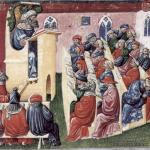 Kataphatic and apophatic theology are two ways we can talk about God. Dionysius, having expressed several apophatic denials for God, understood that apophatic theology has its limits. It does not present God to us any more than kataphatic theology does. God transcends either approach. Indeed, as we deny something to God, we begin to establish a new definition for God based upon those denials. What is left after such denials forms the basis for what we think God is to be. We can, therefore, easily lead ourselves astray, using apophatic theology to establish some sort of definition for God, and so turn away from understanding that whatever we comprehend is not God as he is in himself but some conventional representation of that truth. In this regard, Dionysius said, neither is there any definition (θέσις, that is, a thesis or position which can be set down) at all of It (God), nor any abstraction (ἀφαίρεσις, that is taking-away or denying that which we attribute to God) which forms the basis by which God himself can be absolutely discussed.
Kataphatic and apophatic theology are two ways we can talk about God. Dionysius, having expressed several apophatic denials for God, understood that apophatic theology has its limits. It does not present God to us any more than kataphatic theology does. God transcends either approach. Indeed, as we deny something to God, we begin to establish a new definition for God based upon those denials. What is left after such denials forms the basis for what we think God is to be. We can, therefore, easily lead ourselves astray, using apophatic theology to establish some sort of definition for God, and so turn away from understanding that whatever we comprehend is not God as he is in himself but some conventional representation of that truth. In this regard, Dionysius said, neither is there any definition (θέσις, that is, a thesis or position which can be set down) at all of It (God), nor any abstraction (ἀφαίρεσις, that is taking-away or denying that which we attribute to God) which forms the basis by which God himself can be absolutely discussed.
God as he is in himself is beyond all claims about him, even claims which come from abstraction. God is beyond all kataphatic and apophatic theology, for all such theology is itself a human enterprise; apophatic theology, to be sure, focuses upon the open-ended transcendence of God, and so is better at pointing us to God, but what we say and speak, even through such abstractions, remains discussed through human convention. Even when we try to purify our conception of God through abstraction, we use human logic to deduce what we take away and deny, containing therefore, the limitations inherent with such conventions. All that we say about God, even in apophatic theology, leads to another form of kataphatic theology which then must also be negated. The process, once begun, can and will continue forever, as all such theological discourse, no matter how purified it becomes, will remain on the level of conventional truth; the absolute will always transcend it. Recognizing this will also show how relative all humanly constructed theology is, reminding us that we must not absolutize apophatic theology itself.
St. Albert the Great understood, by making this statement, that Dionysius was making sure we understand the limitations inherent within any theological engagement, so that all theological methods are themselves to be seen as relative means by which we discuss God. This is not to say all methods are equal: apophatic theology leads to a superior apprehension of God than pure kataphatic theology, but what comes from it will never coincide with the absolute truth. In part, this is because our methodology, though superior to kataphatic theology, is formed upon the basis given to by some previous affirmation, and so that negation itself is influence by and contaminated by that affirmation:
“Or negation”: no strictly accurate negation because any negation requires some affirmation, so where there is no true affirmation there will not be any true negation either, although when we are dealing with God negation is truer than affirmation.[1]
Because negation moves us further away from error, it leads us to better apprehensions of the truth, but this improvement remains on the level of relative truth. Being better itself is a relative distinction. The apophatic method remains superior to pure kataphatic theology because it is founded upon the recognition of the limits of human conventions, so that we do not end up construing what we say as being the absolute as it is in itself; but it is because of this that the apophatic method requires the recognition that what it produces remains under the confines of those limitations itself. We can and must try to refine and purify our conventions, and we do so through apophaticism, but they remain conventions and all that we say remains conventional even though the subject of our discourse is the absolute as it is in itself. We cannot define it; we cannot, therefore, abstract ourselves away from our foundation to arrive at it with a definition. Thus, when talking about the absolute, we must always keep in mind, “. . . there is no positive attribution or removal of any kind in this regard.”[2]
Dionysius, therefore, concluded his Mystical Theology, affirming this point by saying: But when making the predications and abstractions of things after It, we neither predicate, nor abstract from It; since the all-perfect and uniform Cause of all is both above every definition and the pre-eminence of Him, Who is absolutely freed from all, and beyond the whole, is also above every abstraction.
Apophatic theology is the way of negation or abstraction. As we begin speaking about God, in whatever way we do so, we end up establishing some sort of definition or idea which we use to present God to others. Nonetheless, because what is contained in that definition will be that which is infinitely less than the transcendence of the absolute truth as it is in itself, God will not be contained by that definition. We will then try to abstract or remove from that definition what we understand to be inferior or less than what the absolute is in itself, leading us to a new conclusion, a new concept or idea which we use to define God. When we accept it as a better presentation of the truth, something which is relatively but not absolutely superior, to what we had before, we have done well. But in the end, we must also assent to the fact that we can neither say anything about the absolute, God, as it is in itself, not abstract our way to reach God because there is an infinite distance between us and God. That is, as Ficino explained: “But in truth that which we cannot attain to anywhere, we cannot add or subtract from. We can only add to and subtract from what is posterior to God.”[3] The more we abstract things, the more we reveal we have not reached the absolute as it is in itself, but remain talking about something posterior to God. It can be great indeed, it can serve as a representation for God, but it remains on the level of being and is something which can be discussed. We can never reach God as he is in himself through our intellect. We can point the way to God, and words are useful there, but God is beyond everything that is, the whole of being, even as he is beyond all abstraction we give to being in order to reach him. This does not deny the value or need for our theological discussions: we need them, but we need to realize the limitations of all of such discussion, so that even the best, represented by mystical theology and God-talk achieved through abstraction, remains itself a mere convention which does not reach God. For anything which we try to say and use to represent God would trap God into human conventions if we think we have reached something which has properly defined God. The fact is God cannot be trapped in this fashion: God cannot be put down in human thought. God absolute, the cause of all things but without cause himself. All that we speak, all that we use to represent God come from the realm of being; we can think only within the confines of the realm of being, so that even our denials reflect the realm of being and do not ascend beyond it. That which is affirmed and that which is denied are interrelated, founded upon a particular definition or concept from the realm of being; denying it is superior because God is superior to the realm of being but what we think and make of it after itself reflects the convention which is denied and so does not establish God as he is in himself. God as the absolute is absolutely free from all that, and only when we realize this can we truly appreciate the relative truth presented by all theological discourse.
[IMG=Pleiades by NASA, ESA, AURA/Caltech, Palomar ObservatoryThe science team consists of: D. Soderblom and E. Nelan (STScI), F. Benedict and B. Arthur (U. Texas), and B. Jones (Lick Obs.) [Public domain], via Wikimedia Commons]
[1] St. Albert the Great, “Commentary on Dionysius’ Mystical Theology” in Albert & Thomas, Selected Writings. Trans. Simon Tugwell, OP (New York: Paulist Press, 1988), 198.
[2] Thomas Gallus “Exposicio” in Mystical Theology: The Glosses of Thomas Gallus and the Commentary of Robert Grosseteste on De Mystica Theologia. Trans. and ed. By James McEvoy (Parish: Peeters, 2003), 51.
[3] Marsilio Ficino, Mystical Theology in Marsilio Ficino: On Dionysius the Areopagite. Volume I: Mystical Theology and The Divine Names, Part I. trans. And ed. Michael J. B. Allen (Cambridge: Harvard University Press, 2015), 83.
Stay in touch! Like A Little Bit of Nothing on Facebook













